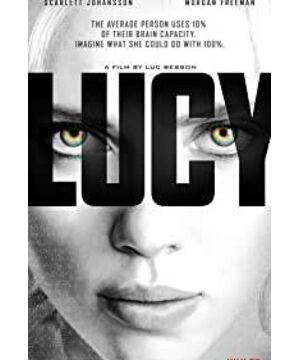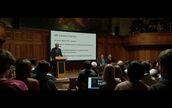of "Superbody " / Liao Hongfei's
recently hit Luc Besson's " Superbody " movie poster has an impressive sentence: I am everywhere. In this movie, the heroine played by Scarlett finally transcends the limitations of the human body. She is with everything and can be transformed into any object or flow of energy, truly achieving ubiquity and becoming a true meaning. God who is omniscient and omnipotent. Having ubiquitous viewpoints and ubiquitous shooting angles has always been the ideal of movies. We don’t have to seriously examine the reality of the movie. In the author’s opinion, this movie is better to be regarded as a philosophical movie than a sci-fi movie (whether it is soft sci-fi or hard sci-fi, it is full of loopholes). . This movie is only about idea. Since Plato, idea has always been the core issue of philosophy. It is something that cannot be avoided in thinking about and seeing the world. And the theory on which we see and think about the world, theoria, is contemplation in Greek, which is to see, to gaze, and to perceive. It is equally important to philosophy and theology. Every philosopher and theologian wants to transcend the limitations of human perspective and try to approach the absolute view of God: omniscience and omnipotence, no omission, absolute truth.
Djiga Vertov’s “movie eyes” embraces such a concept that transcends the limitations of the human eye’s perspective. It is no longer to see the material world through human eyes, but to try to see through the material eyes. Matter, to capture the incredible movements and changes in nature that are often overlooked by the limited perspective of mankind. This is an impulse to try to get close to God, or become a God. When Jill Deleuze commented on Vertov, he said: “For Vertov, the gap in motion is perception, a glimpse, and eyes. But these eyes are not the stationary human eyes. It is the eye of the lens, the eye of the material, the perception in the material" (Deleuze, Cinema 2:39-40). In Deleuze's eyes, why is film so important? In what sense is it more capable of thinking about the world than philosophy? In my opinion, it is because the "eyes" of the movie can provide a perspective that does not depend on human will to view the world.
Yes, although people are operating behind every camera, it seems impossible to completely separate from human will and existence. "My camera doesn't lie"? Of course it may lie. But what the eyes of the movie see, even if it is not something out of the perspective and will of man, is at least something beyond the limited perspective of man. In this sense, what the camera can give us is a pair of "inhuman eyes." Here, "non-human" is not a simple denial of humans, but refers to the "duration" (duration) that is higher or lower than human experience in Bergson's sense. For Deleuze and Bergson, human intelligence will reduce qualitative differences to differences in degree. Only through intuition can this limitation of human perception be surpassed, thus "to the inhuman or superhuman (those Things lower or higher than ourselves) and open up to transcend the human condition: this is the meaning of philosophy, because so far our own condition has imprisoned our lives in poorly analyzed complexes, and We used this bad analysis to form ourselves." (Deleuze, Bergonism, 27) For Deleuze, film, like philosophy, thinks about the world in various ways. The difference is that film relies on images, while philosophy relies on concepts. To borrow the name of a best-selling book by Zizek, we said: If philosophy can't tell you, then ask the movie. At least for Deleuze. His two-volume "Movies", which covers an astonishing number of classic movies and is woven from complicated and obscure concepts, is such an attempt.
In "Super Body", Lucy, who has no power to bind a chicken, was used by Korean gangsters to transport drugs to the human body, but unfortunately was beaten by gangsters. The CHP4 in his body leaked into the human body, which caused earth-shaking changes in the entire human body. In the movie, her physical potential is gradually activated by CHP4, and finally transcends the limitations of human beings: from restoring absolute and unforgettable memories to controlling objects with will, from the decomposition of the physical body to the transformation into energy- The flow of matter, from tangible existence to intangible existence, from being in this moment to any flow of time...
With the evolution of Lucy's body, what is presented to us is not vulgar physics, but the core philosophical proposition: the relationship between mind and matter, spirit and matter. The Marxist philosophy in the vulgar and far-reaching middle school textbooks tells us that matter precedes consciousness, and matter determines consciousness. Its opposite is the intentionality of Husserl's phenomenology criticized by Deleuze in "Movie 1: Motion-Image", "Any consciousness is the consciousness of something", it gives priority to natural perception, thinking that The consciousness of experience is like light, it is the prerequisite for us to see and understand things. For Bergson, the opposite is true, “things are bright in themselves, not illuminated by anything: any consciousness itself is something, it cannot be separated from things, it is the image of light... in short Consciousness is not light. The collection of images or light is the consciousness that is in the matter.” (Deleuze, Cinema 1:60-61) According to Deleuze’s theory, the reason why we can see the world is because The substance itself carries light, with the possibility of being viewed and thought. The material world is not an object of passive investigation, it is far from being an inert thing, because there is a pair of eyes in the material, which sees itself. We are able to watch because we are an effect of the material world, and we ourselves carry the mission of material viewing. But we are also finite beings, and we need to transcend our own limitations and experience the extension that is higher or lower than ourselves.
"Image is movement, just as matter is light" (ibid:60), says Deleuze. "Anything, that is to say, any image, is indistinguishable from its effects and reactions: it is the change of the universe" (ibid.). The entire universe, matter, light, energy, spirit... They are all images, they are all changes and ripples of various degrees in the unified universe. The material universe is an internal plane, which is composed of an infinite collection of images. "The image itself exists on this plane. The image itself is matter: it is not something hidden behind the image, but on the contrary, it is the absolute identity of the image and the movement" (ibid: 59). The material universe is an internal plane, a mechanical assembly of motion and image. In this sense, "the universe itself is a movie, a meta-movie" (ibid.). Deleuze's universe is not only a movie, but also a pantheistic world: here, one is manifested in many, and many is one. In the material universe, images interact, assemble, assemble, and evolve automatically and autonomously; from a spiritual perspective, they are watching, contemplating, and producing.
Finally, we return to "Superbody" and notice the root of Lucy. Lucia means bright, interpreted as lucid, clear, transparent, lucent, bright... Indeed, the heroine's name is inseparable from the possibility of watching and watching. At the beginning of "Old Testament•Genesis", God's first sentence in creating this world was: There must be light. We might as well regard the movie "Superbody" as a postmodern version of Genesis: the first ape-man was named lucy, and the man who broke through the limitations of human beings (the last man) and became a god is also called lucy. End to end, self-derived. In the classic creation story, God created man, and in Luc Besson's postmodern version of the creation story, it was the man who usurped the position of God who created himself. In the movie, Lucy's fingertip touch between time and ape-man is basically a parody of Michelangelo's famous "Creation of Adam". Here, people who create themselves form an absolute immanence just as they view their own material, and we humans are precisely the carrier or purified function-image of viewing this function.
View more about Lucy reviews











